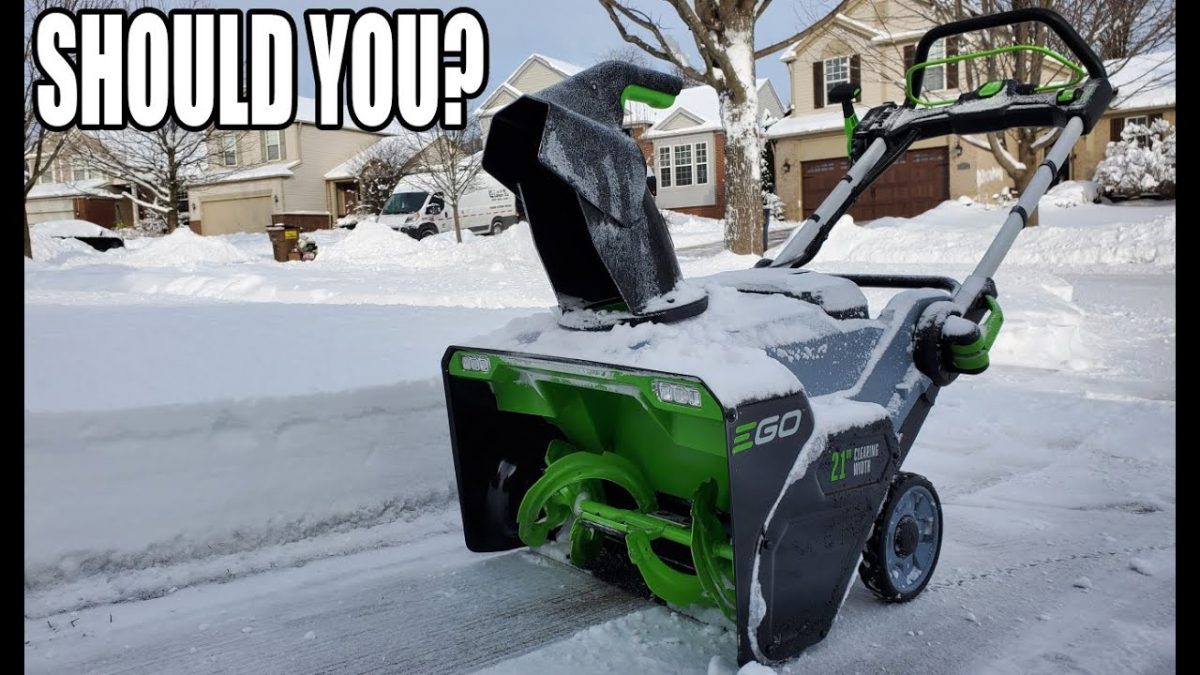Winter is coming, and with it, the inevitable task of clearing snow from driveways, sidewalks, and patios. If you live in an area that receives heavy snowfall, you’ve probably asked yourself, “Should I get an electric snow blower?” In this article, we’ll delve deep into the pros and cons of electric snow blowers, their efficiency, and whether they’re the right choice for you.
Key Takeaways:
- Electric snow blowers are environmentally friendly and quieter than gas-powered ones.
- They are best suited for light to moderate snowfall.
- Maintenance is minimal, but they might not be as powerful as their gas counterparts.
Table of Contents
Why Consider an Electric Snow Blower?

EGO Electric Snow Blower 1 Year Later………Was It Worth It?
Eco-Friendly and Quiet Operation
Electric snow blowers are powered by electricity, either through a cord or a battery. This means they don’t emit harmful fumes like gas-powered blowers. They’re also significantly quieter, making early morning or late-night snow clearing less disruptive to neighbors.
Ease of Use and Maintenance
Starting an electric snow blower is as simple as pushing a button. There’s no need to worry about fuel mixtures, spark plugs, or oil changes. Maintenance is minimal, with only occasional cleaning and inspection required.
Cost-Effective in the Long Run
While the initial cost might be higher than some gas models, electric snow blowers can be more cost-effective over time. You won’t have to buy gas or oil, and there are fewer parts that can break down.
Limitations of Electric Snow Blowers

Power and Snow Clearing Capacity
Electric snow blowers might not be as powerful as gas models. They’re best suited for light to moderate snowfall, typically up to 8 inches. For heavy snowfall or wet, slushy snow, a gas-powered blower might be more efficient.
Corded vs. Cordless
Corded models can limit mobility, especially if you have a large area to clear. On the other hand, cordless models run on batteries, which can run out in the middle of a job if you’re not careful.
What Do Others Say?
To get a better understanding, let’s look at some relevant YouTube videos on the topic:
Electric Snow Blower Features to Consider

Clearing Width and Depth
Consider the size of the area you’ll be clearing. A wider clearing width can help you finish the job faster, but it might be harder to maneuver in tight spaces.
Battery Life (for cordless models)
If you’re considering a cordless model, check the battery life. Some models offer up to 45 minutes of run time, while others might last only 20 minutes.
Additional Features
Look for features like adjustable chute direction, headlight for nighttime use, and ergonomic handles for comfort.
Comparing Electric Snow Blowers with Gas-Powered Ones
| Feature | Electric Snow Blower | Gas-Powered Snow Blower |
|---|---|---|
| Power Source | Electricity (corded or battery) | Gasoline |
| Emissions | None | Produces emissions |
| Noise Level | Quieter | Louder |
| Maintenance | Minimal | Regular maintenance required |
| Best For | Light to moderate snow | Heavy snowfall |
External Resources
For more in-depth information, check out these external resources:
Electric vs. Gas Snow Blowers
When it comes to the debate between electric and gas snow blowers, both have their merits and drawbacks. Let’s dive deeper into the comparison to help you make an informed decision.
Electric Snow Blowers: The Pros
- Eco-Friendly: With zero emissions, electric snow blowers are a green choice.
- Quiet Operation: No more waking up the neighbors during early morning snow clearing.
- Low Maintenance: No oil changes, spark plug replacements, or carburetor cleanups.
- Lightweight: Easier to handle and maneuver, especially for smaller areas.
Gas Snow Blowers: The Pros
- Powerful Performance: Gas snow blowers can handle deeper and heavier snow with ease.
- Larger Clearing Width: Some gas models offer clearing widths up to 45 inches.
- Self-Propelled: Many gas models are self-propelled, making them easier to navigate.
- No Dependency on Electricity: No cords or batteries to worry about.
Making the Choice
The choice between electric and gas largely depends on your specific needs. If you have a smaller area to clear and prefer a quieter, eco-friendly option, an electric snow blower might be for you. However, if you have a larger driveway or frequently experience heavy snowfall, a gas model might be more efficient.
For a more detailed comparison, check out this article on the pros and cons of electric vs. gas snow blowers.
Relevant Videos and External Links
- Top 5 Best Electric Snow Blowers For 2019 – 2020
- The 5 Best Electric Snow Blowers Of 2022
- 5 Best Electric Snow Blowers 2022
- Differences Between Gas and Electric Snow Blowers
Internal Links
For more insights on winter home preparation and maintenance, check out these articles from Welcome To The One Percent:
- The Ultimate Moon Milk Guide: What is Moon Milk?
- Free Christmas Word Search for Kids: Unwrap the Joy!
Frequently Asked Questions (FAQs)
1. Are electric snow blowers as powerful as gas snow blowers?
While electric snow blowers are efficient for light to moderate snowfall, they may not be as powerful as gas models for heavy snowfall. Gas snow blowers typically have larger engines and can handle deeper and wetter snow more effectively.
2. How long does the battery last on a cordless electric snow blower?
Battery life varies depending on the model and usage. On average, a fully charged battery can last between 30 to 60 minutes. It’s always a good idea to have a backup battery charged and ready, especially for larger jobs.
3. Can I use an extension cord with a corded electric snow blower?
Yes, you can use an extension cord with a corded electric snow blower. However, ensure that the cord is rated for outdoor use and can handle the amperage of the snow blower. Also, be cautious of the cord while operating to avoid tripping or running over it.
4. How do I maintain my electric snow blower?
Electric snow blowers require minimal maintenance. Regularly check for any signs of wear or damage, especially on the auger and chute. Clean the machine after each use to remove any snow or debris. For cordless models, ensure the battery is charged and stored in a cool, dry place.
5. Are electric snow blowers suitable for heavy, wet snow?
Electric snow blowers are best suited for light to moderate, fluffy snow. They might struggle with heavy, wet snow. If you frequently experience wet snow, a gas-powered model might be a better choice.
6. How do electric snow blowers impact the environment compared to gas models?
Electric snow blowers are more environmentally friendly as they produce zero emissions. Gas models, on the other hand, emit carbon dioxide and other pollutants. If you’re looking for a greener option, electric is the way to go.
7. What safety precautions should I take when using an electric snow blower?
Always read the manufacturer’s safety guidelines before use. Ensure the machine is turned off and unplugged (or the battery is removed) before performing any maintenance or clearing jams. Avoid wearing loose clothing, and always wear safety goggles and gloves. Keep children and pets away from the area while operating the machine.
8. How long do electric snow blowers typically last?
With proper care and maintenance, electric snow blowers can last several years. The lifespan varies depending on the model, usage, and how well it’s maintained.
9. Are there any hidden costs associated with electric snow blowers?
While electric snow blowers might have a higher upfront cost, they generally have lower operating costs as there’s no need for gas or oil. However, if you opt for a battery-operated model, you might need to replace the battery after a few years, which can be an additional cost.
10. Can I use an electric snow blower on gravel or uneven surfaces?
It’s best to use electric snow blowers on smooth, paved surfaces. If used on gravel or uneven terrains, there’s a risk of picking up and throwing rocks, which can be dangerous and damage the machine.
We hope these FAQs provide clarity on electric snow blowers and help you make an informed decision. If you have any more questions, always refer to the manufacturer’s guidelines or consult with a local expert.





